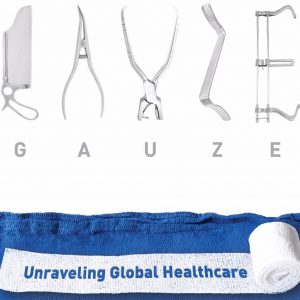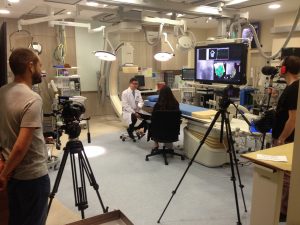‘GAUZE: Unravelling Global Healthcare’ takes fear out of falling ill abroad
 Among the documentaries to be screened this year by the Fort Myers Film Festival is GAUZE: Unraveling Global Healthcare, a 26-minute film directed by Suzanne Garber.
Among the documentaries to be screened this year by the Fort Myers Film Festival is GAUZE: Unraveling Global Healthcare, a 26-minute film directed by Suzanne Garber.
GAUZE: Unravelling Global Healthcare is a short documentary produced, written, and directed by Philadelphia/Miami based filmmaker and former IERG board member Suzanne Garber that chronicles her 2014-2016 journey to 174 hospitals in 24 countries where she interviewed 65 international healthcare experts on what constitutes the  “best” in healthcare. After removing herself from her lucrative, corporately-sponsored medical insurance plan, Garber signed up for medical insurance through the Affordable Care marketplace. She then filmed incognito and undercover as she was dropped from doctor’s practices, given erroneous information regarding coverage, and routinely overcharged for care. Fed up with the American system of healthcare, Garber turned her sights on international medical venues to bring back solutions to the U.S.
“best” in healthcare. After removing herself from her lucrative, corporately-sponsored medical insurance plan, Garber signed up for medical insurance through the Affordable Care marketplace. She then filmed incognito and undercover as she was dropped from doctor’s practices, given erroneous information regarding coverage, and routinely overcharged for care. Fed up with the American system of healthcare, Garber turned her sights on international medical venues to bring back solutions to the U.S.
Garber’s intent was to show what health care facilities outside the United States are like and to tell viewers not to be afraid if you do get sick or injured while traveling overseas. Noting that most Americans who fall ill while  travelling outside the United States will typically stick it out and wait until they get home, treatment in most other countries is actually on a par with, or better than, what they’d receive here at home. And that’s not hyperbole when you consider that the U.S. is just 37th on the World Health Organization’s ranking of global health systems. Thus, you are likely to get better care in 36 other countries.
travelling outside the United States will typically stick it out and wait until they get home, treatment in most other countries is actually on a par with, or better than, what they’d receive here at home. And that’s not hyperbole when you consider that the U.S. is just 37th on the World Health Organization’s ranking of global health systems. Thus, you are likely to get better care in 36 other countries.
“Ironically, Cuba is ranked 39th,” Garber told Chip Taulbee for The Mensa Bulletin in October of 2017. “I’ve actually done a medical  mission to Cuba where I witnessed them using fishing wire as a suture. So if we’re only two spots ahead of Cuba, and they’re doing that, that doesn’t really say a whole lot about our system.”
mission to Cuba where I witnessed them using fishing wire as a suture. So if we’re only two spots ahead of Cuba, and they’re doing that, that doesn’t really say a whole lot about our system.”
Health care in the United States is, for better or worse, tied inextricably to politics, and many people rankle  when they hear claims that the U.S. healthcare system ranks so low in comparison to other countries. While the U.S. is unquestionably awesome when it comes to emergency and critical care, we hardly pay any attention to the type of preventative care that extends both quality of life and life expectancy. As proof, ask yourself how often you and the people you know work out, evaluate your dietary choices or go to the doctor for
when they hear claims that the U.S. healthcare system ranks so low in comparison to other countries. While the U.S. is unquestionably awesome when it comes to emergency and critical care, we hardly pay any attention to the type of preventative care that extends both quality of life and life expectancy. As proof, ask yourself how often you and the people you know work out, evaluate your dietary choices or go to the doctor for  preventive health checkups?
preventive health checkups?
Garber’s quest was informed not only by her eight year career in the health care industry, but her own experiences as a frequent consumer of health care services. Garber suffered appendicitis while living in Spain, bronchitis in Greece, malaria in Mexico and leptospirosis in the Dominican  Republic. In addition to a bout with ovarian cancer here in the States, she suffered from a rare aortic-based heart defect that took forty years to properly diagnose. And that implicates yet another indictment of the U.S. healthcare system. In spite of all the diagnostic tests and equipment
Republic. In addition to a bout with ovarian cancer here in the States, she suffered from a rare aortic-based heart defect that took forty years to properly diagnose. And that implicates yet another indictment of the U.S. healthcare system. In spite of all the diagnostic tests and equipment  available to doctors and hospitals, the third leading cause of death in the United States is medical error, which equates to more than 300,000 deaths per annum.
available to doctors and hospitals, the third leading cause of death in the United States is medical error, which equates to more than 300,000 deaths per annum.
As a result of this statistic and her own experiences with the diagnosis and treatment she received incident to her various illnesses, Garber  advocates for people to take a more active role in the course of their own care and treatment. That begins with bringing someone with them to doctor appointments so that key information is not forgotten or misunderstood. Second opinions are not just sound practice, they can save thousands, even
advocates for people to take a more active role in the course of their own care and treatment. That begins with bringing someone with them to doctor appointments so that key information is not forgotten or misunderstood. Second opinions are not just sound practice, they can save thousands, even  tens of thousands, of dollars in medical expenses as the fees charged by individual doctors and medical groups vary widely and are often disparate. Even though patients are held responsible for paying for any healthcare charges not covered by insurance, they are rarely told in advance what those charges are prior to care being provided. To Garber’s way of thinking, you wouldn’t buy a hamburger, oil change, or airline ticket without knowing the price prior to sale, so why should healthcare be any different?
tens of thousands, of dollars in medical expenses as the fees charged by individual doctors and medical groups vary widely and are often disparate. Even though patients are held responsible for paying for any healthcare charges not covered by insurance, they are rarely told in advance what those charges are prior to care being provided. To Garber’s way of thinking, you wouldn’t buy a hamburger, oil change, or airline ticket without knowing the price prior to sale, so why should healthcare be any different?
GAUZE: Unravelling Global Healthcare is chock full of insider information and tips for the wary. And best of all, you don’t need to be a healthcare guru to benefit from this documentary. It’s also important to know that while the film touches on hotbed topics like the Affordable Care Act, Garber harbors no political agenda  beyond laying bare a no-holds-barred analysis of what’s best when it comes to healthcare, whether in the United States or abroad.
beyond laying bare a no-holds-barred analysis of what’s best when it comes to healthcare, whether in the United States or abroad.
The documentary will be shown twice during the Fort Myers Film Festival. Your first opportunity to view GAUZE: Unravelling Global Healthcare is at 5:30 p.m. on Thursday, March 22 in the IMAG History & Science Center at 2000 Cranford Ave. It will be screened again at the Alliance for the Arts during the 10:00 a.m. block on Saturday, March 24.
March 5, 2018.
 RELATED POSTS.
RELATED POSTS.
- About the 8th Annual Fort Myers Film Festival
- Fort Myers Film Festival to open with ‘Melody Makers’ rock doc
- Photographer Barrie Wentzell in the frame
- ‘Melody Makers’ director Leslie Ann Coles in the frame
- “What is Classic Rock’ is all about the music
- ‘Don’t Sell My Guitars’ love letter by filmmaker Lynn Montgomery to her dad
- ‘The Maestro’ looks at post-World War II Hollywood film composers
 The Maestro’s Mario Castelnuovo-Tedesco in the frame
The Maestro’s Mario Castelnuovo-Tedesco in the frame- ‘Let It Shine: The Story of the Women’s March SLO’
- ‘Kids News’ a tribute to Naples’ Judy Lawrence
- Fort Myers Film Festival to screen sensational new Ruth Bader Ginsburg doc
- ‘RBG’ doc filmmakers Betsy West and Julie Cohen in the frame
- ‘NOA’ enigmatic film about the price of freedom
- ‘NOA’ filmmaker Angel Barroeta in the frame
- ‘NOA’ leading actor Hunter Hall in the frame














 Tom Hall is both an amateur artist and aspiring novelist who writes art quest thrillers. He is in the final stages of completing his debut novel titled "Art Detective," a story that fictionalizes the discovery of the fabled billion-dollar Impressionist collection of Parisian art dealer Josse Bernheim-Jeune, thought by many to have perished during World War II when the collection's hiding place, Castle de Rastignac in southern France, was destroyed by the Wehrmacht in reprisal for attacks made by members of the Resistance operating in the area. A former tax attorney, Tom holds a bachelor's degree as well as both a juris doctorate and masters of laws in taxation from the University of Florida. Tom lives in Estero, Florida with his fiancee, Connie, and their four cats.
Tom Hall is both an amateur artist and aspiring novelist who writes art quest thrillers. He is in the final stages of completing his debut novel titled "Art Detective," a story that fictionalizes the discovery of the fabled billion-dollar Impressionist collection of Parisian art dealer Josse Bernheim-Jeune, thought by many to have perished during World War II when the collection's hiding place, Castle de Rastignac in southern France, was destroyed by the Wehrmacht in reprisal for attacks made by members of the Resistance operating in the area. A former tax attorney, Tom holds a bachelor's degree as well as both a juris doctorate and masters of laws in taxation from the University of Florida. Tom lives in Estero, Florida with his fiancee, Connie, and their four cats.